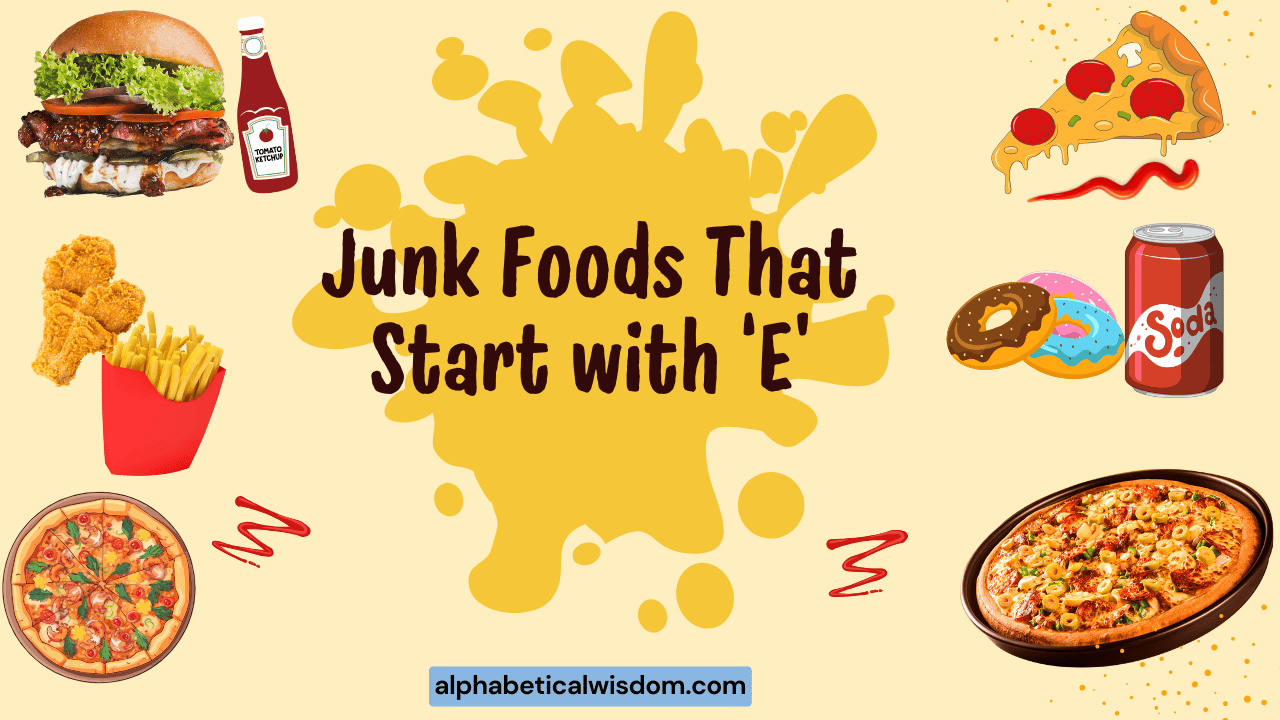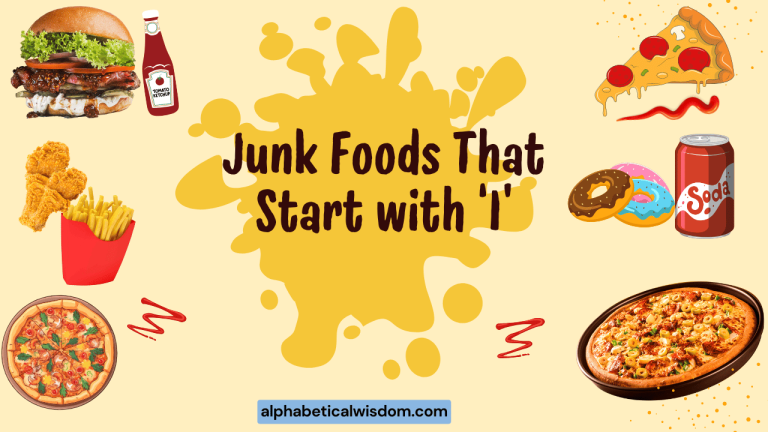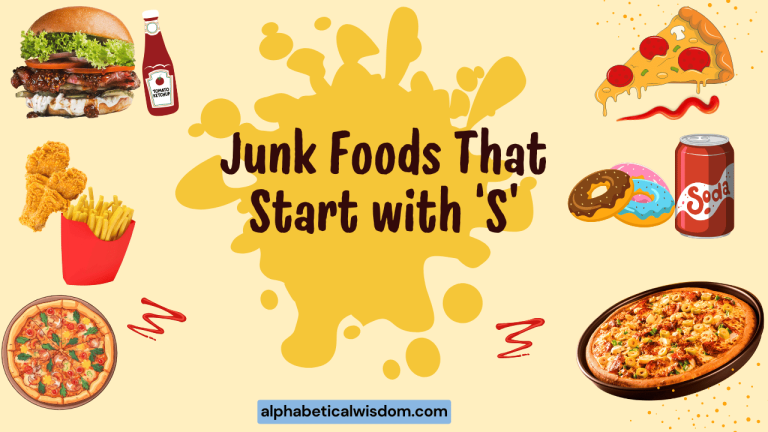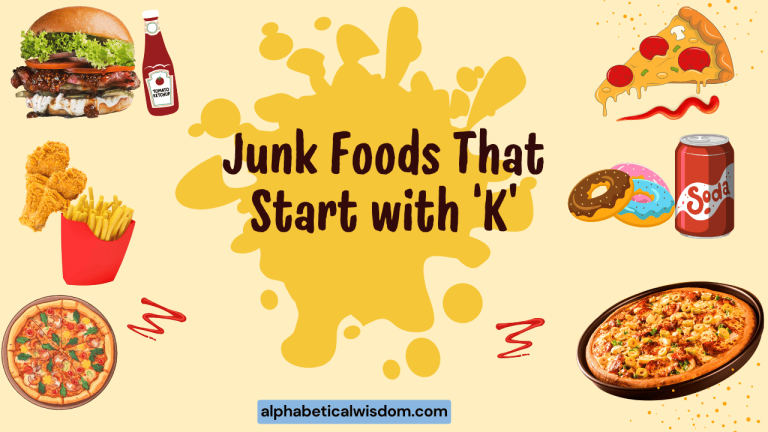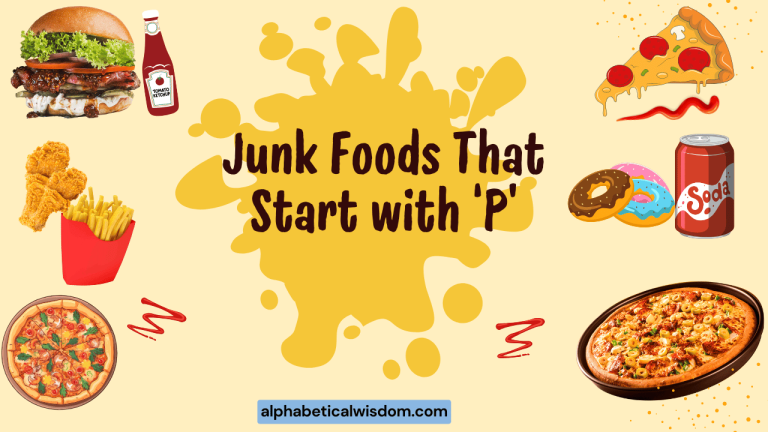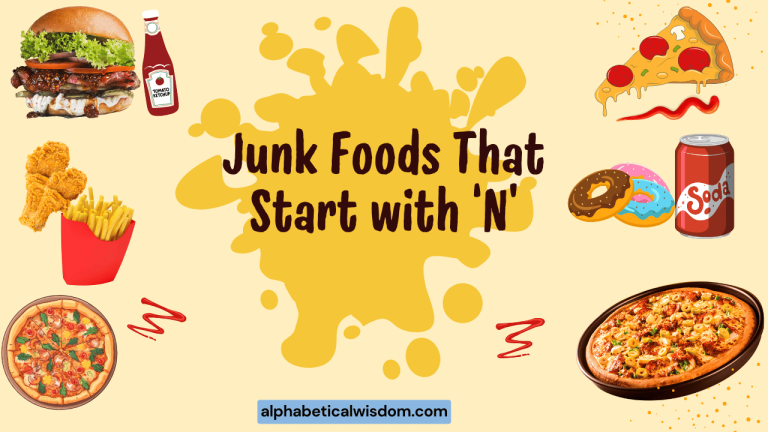Junk Foods That Start With ‘E’: A Grammatical Exploration
Exploring the world of junk food might not seem like a typical grammar lesson, but it offers a fun and engaging way to delve into the intricacies of the English language. By focusing on junk foods starting with the letter “E,” we can examine various grammatical concepts such as nouns, adjectives, and even sentence structure.
This article is designed to benefit English language learners of all levels, from beginners looking to expand their vocabulary to advanced speakers aiming to refine their understanding of nuanced grammar rules. Get ready to combine your love for snacks with a solid dose of English grammar!
This article will equip you with the knowledge to identify, describe, and use these terms correctly in different contexts. Whether you’re writing a shopping list, discussing your favorite treats, or analyzing food marketing, understanding the grammar related to these terms will enhance your communication skills.
Table of Contents
- Introduction
- Definition: Junk Foods Starting With ‘E’
- Structural Breakdown of Noun Phrases
- Types and Categories of Junk Foods
- Examples of ‘E’ Junk Foods in Sentences
- Usage Rules and Grammatical Considerations
- Common Mistakes and How to Avoid Them
- Practice Exercises
- Advanced Topics: Figurative Language
- Frequently Asked Questions
- Conclusion
Definition: Junk Foods Starting With ‘E’
Junk foods, generally, are defined as foods that have low nutritional value and are high in calories, fats, sugars, and/or salt. When we narrow our focus to junk foods that start with the letter “E,” we find a more specific, albeit still diverse, category. These foods function primarily as countable nouns in English grammar. They can be singular (e.g., an éclair) or plural (e.g., éclairs). They are often modified by adjectives to provide more detail about their flavor, texture, or appearance.
Junk foods starting with “E” are typically found in contexts related to: snack foods, desserts, confectionary, and processed foods. The term ‘junk food’ is itself a mostly informal term, often used in everyday conversations and less frequently in formal, academic writing unless the context specifically involves a discussion of dietary habits or nutritional science.
The words can be used in descriptive sentences, recipes, nutritional guides, and casual conversations about food preferences.
Structural Breakdown of Noun Phrases
Understanding the structure of noun phrases involving junk foods starting with “E” is crucial for constructing grammatically correct and meaningful sentences. A basic noun phrase consists of a noun (the junk food) and can be expanded with determiners, adjectives, and prepositional phrases.
Basic Noun Phrase Structure
The simplest structure is just the noun itself: “Éclairs are delicious.” Here, “Éclairs” functions as the subject of the sentence.
Adding Determiners
Determiners specify the noun. Examples include articles (a, an, the), possessive pronouns (my, your, his), and quantifiers (some, many, few):
- The éclair was perfectly glazed.
- My favorite éclairs are from that bakery.
- Some egg rolls are surprisingly unhealthy.
Adding Adjectives
Adjectives describe the characteristics of the noun. They usually precede the noun: “A creamy éclair,” “Crispy egg rolls.”
Adding Prepositional Phrases
Prepositional phrases provide additional information about the location, time, or other aspects of the noun: “Éclairs with chocolate frosting,” “Egg rolls from the Chinese restaurant.”
Examples of Complex Noun Phrases
Here are some examples combining all these elements:
- “The delicious, chocolate-filled éclair was gone in seconds.”
- “My favorite crispy egg rolls from the local takeout place are always a treat.”
- “Some freshly-made, sweet empanadas are perfect with coffee.”
Types and Categories of Junk Foods
Junk foods that start with the letter “E” can be categorized in several ways, based on their primary ingredients, preparation methods, or cultural origin.
Based on Primary Ingredients
- Egg-based: Egg rolls, Eggs Benedict (when considered a less nutritious brunch item)
- Extracts & Essences: Foods using artificial flavors like ethyl maltol to enhance sweetness in candies.
- Enriched Flour based: Empanadas (depending on filling), English Muffins (when heavily buttered and sweetened)
Based on Preparation Methods
- Fried: Egg rolls, Empanadas (sometimes), Elephant Ears
- Baked: Éclairs, English Muffins (toasted with toppings), Empanadas (sometimes)
Based on Cultural Origin
- Asian: Egg rolls
- French: Éclairs
- Latin American/Spanish: Empanadas
Examples of ‘E’ Junk Foods in Sentences
This section provides numerous examples of how junk foods starting with “E” can be used in sentences. The examples are categorized to illustrate different grammatical contexts.
Examples with Éclairs
The following table shows examples of how the word “éclair” is used in sentences.
| Sentence | Grammatical Feature |
|---|---|
| The éclair was filled with vanilla cream. | Singular noun as subject |
| She ate an éclair after lunch. | Singular noun as object |
| Éclairs are my favorite dessert. | Plural noun as subject |
| He brought a box of éclairs to the party. | Plural noun as object |
| That bakery makes the best chocolate éclairs. | Plural noun as object |
| I bought a delicious éclair from the patisserie. | Singular noun with adjective |
| The creamy éclair melted in my mouth. | Singular noun with adjective |
| Fresh éclairs are always a treat. | Plural noun with adjective |
| She prefers vanilla éclairs over chocolate ones. | Plural noun with adjective |
| The display case was full of tempting éclairs. | Plural noun with adjective |
| He offered her an éclair with a smile. | Singular noun in a simple sentence |
| Eating an éclair always brightens my day. | Singular noun as a gerund |
| We shared a large éclair between us. | Singular noun indicating sharing |
| The éclair was so rich, I could only eat half. | Singular noun describing richness |
| I dream of éclairs when I’m on a diet. | Plural noun expressing a craving |
| Baking éclairs requires precision and patience. | Plural noun as a gerund |
| The aroma of freshly baked éclairs filled the kitchen. | Plural noun describing aroma |
| She learned to make éclairs at culinary school. | Plural noun indicating a skill |
| Éclairs are a classic French pastry. | Plural noun defining a pastry |
| The history of éclairs is fascinating. | Plural noun indicating history |
| He always orders éclairs when we go to that café. | Plural noun as a regular order |
| She decorated the éclairs with chocolate shavings. | Plural noun describing decoration |
| The éclairs were arranged beautifully on the plate. | Plural noun describing arrangement |
| My grandmother’s éclairs are legendary. | Plural noun indicating a family tradition |
| The éclair recipe has been passed down for generations. | Singular noun indicating legacy |
| I felt guilty after eating three éclairs. | Plural noun expressing guilt |
| The éclair was the perfect ending to the meal. | Singular noun describing a perfect ending |
| The éclair shop is always busy on weekends. | Singular noun describing a popular place |
Examples with Egg Rolls
The following table shows examples of how the word “egg roll” is used in sentences.
| Sentence | Grammatical Feature |
|---|---|
| He ordered an egg roll with his soup. | Singular noun as object |
| Egg rolls are a popular appetizer. | Plural noun as subject |
| She loves dipping egg rolls in sweet and sour sauce. | Plural noun as object |
| The crispy egg roll was filled with vegetables. | Singular noun with adjective |
| They served mini egg rolls at the party. | Plural noun with adjective |
| I always crave an egg roll after visiting the Chinese restaurant. | Singular noun expressing a craving |
| The aroma of frying egg rolls filled the air. | Plural noun describing aroma |
| Homemade egg rolls are always the best. | Plural noun with adjective |
| He ate several egg rolls before the main course. | Plural noun indicating quantity |
| The secret to great egg rolls is the filling. | Plural noun discussing a secret |
| She learned to make egg rolls from her grandmother. | Plural noun indicating a skill |
| Egg rolls are often served with dipping sauces. | Plural noun describing accompaniment |
| The egg roll recipe is a family tradition. | Singular noun indicating a tradition |
| He prefers his egg rolls extra crispy. | Plural noun expressing preference |
| The egg roll was too greasy for my taste. | Singular noun expressing opinion |
| Ordering egg rolls is a must when we get takeout. | Plural noun as a regular order |
| The egg roll vendor always has a long line. | Singular noun describing a popular food |
| I tried a new type of egg roll with shrimp filling. | Singular noun describing a new experience |
| Egg rolls are a staple at many Asian buffets. | Plural noun describing a buffet item |
| The history of egg rolls is quite interesting. | Plural noun indicating history |
| She carefully wrapped the filling in the egg roll wrapper. | Singular noun describing preparation |
| The egg roll was served piping hot. | Singular noun describing serving temperature |
| He shared his egg rolls with his friends. | Plural noun describing sharing |
| The egg roll was the first thing to disappear at the party. | Singular noun describing popularity |
| Making egg rolls from scratch takes time and effort. | Plural noun as a gerund |
| The egg roll was the perfect appetizer. | Singular noun describing a perfect appetizer |
| The egg roll stand is a local favorite. | Singular noun describing a popular place |
Examples with Empanadas
The following table shows examples of how the word “empanada” is used in sentences.
| Sentence | Grammatical Feature |
|---|---|
| She baked a batch of chicken empanadas. | Plural noun as object |
| An empanada makes a great snack. | Singular noun as subject |
| The empanada was filled with spicy beef. | Singular noun with adjective |
| Freshly baked empanadas are irresistible. | Plural noun with adjective |
| He ate a cheese empanada for lunch. | Singular noun as object |
| Making empanadas is a tradition in my family. | Plural noun indicating a family tradition |
| The empanada dough was perfectly flaky. | Singular noun describing texture |
| She learned to make empanadas from her mother. | Plural noun indicating a skill |
| Empanadas are a popular street food in Latin America. | Plural noun describing a food type |
| The empanada recipe has been passed down for generations. | Singular noun indicating legacy |
| He prefers his empanadas baked rather than fried. | Plural noun expressing preference |
| The empanada vendor always has a variety of fillings. | Singular noun describing a vendor |
| I tried a spinach and feta empanada for the first time. | Singular noun describing a new experience |
| Empanadas are often served with a side of salsa. | Plural noun describing accompaniment |
| The empanada was the perfect comfort food. | Singular noun describing comfort food |
| Ordering empanadas is a must when we visit that restaurant. | Plural noun as a regular order |
| The aroma of baking empanadas filled the kitchen. | Plural noun describing aroma |
| She carefully crimped the edges of the empanada. | Singular noun describing preparation |
| Empanadas can be filled with sweet or savory ingredients. | Plural noun describing filling options |
| The history of empanadas dates back centuries. | Plural noun indicating history |
| He shared his empanadas with his coworkers. | Plural noun describing sharing |
| The empanada was the star of the potluck. | Singular noun describing food popularity |
| Making empanadas from scratch is a labor of love. | Plural noun as a gerund |
| The empanada stand is always crowded during lunch. | Singular noun describing a popular place |
| I crave a warm empanada on a cold day. | Singular noun expressing a craving |
Usage Rules and Grammatical Considerations
When using junk food names in sentences, there are several grammatical rules to keep in mind. These include subject-verb agreement, article usage, and the correct use of plural forms.
Subject-Verb Agreement
The verb in a sentence must agree in number with the subject. If the subject is singular, the verb must be singular; if the subject is plural, the verb must be plural.
- Correct: The éclair is delicious.
- Correct: Éclairs are delicious.
Article Usage
Use “a” or “an” before singular, countable nouns when they are indefinite. Use “the” when referring to a specific item or when the noun has already been mentioned.
- I ate an éclair. (Indefinite)
- The éclair I ate was delicious. (Specific)
Plural Forms
Most nouns form their plural by adding “-s” to the end. However, some nouns have irregular plural forms.
- Éclair – Éclairs
- Egg roll – Egg rolls
- Empanada – Empanadas
Common Mistakes and How to Avoid Them
Even experienced English speakers sometimes make mistakes when using these terms. Here are some common errors and how to avoid them.
| Incorrect | Correct | Explanation |
|---|---|---|
| The éclairs is delicious. | The éclairs are delicious. | Subject-verb agreement: plural subject “éclairs” requires plural verb “are”. |
| I want a egg roll. | I want an egg roll. | Article usage: Use “an” before words that start with a vowel sound. |
| I ate three éclair. | I ate three éclairs. | Plural form: Use the plural form “éclairs” when referring to more than one. |
| The empanadas is very tasty. | The empanadas are very tasty. | Subject-verb agreement: plural subject “empanadas” requires plural verb “are”. |
| I would like an empanada please. | I would like an empanada, please. | Punctuation: A comma is needed before “please” when it is used as a polite addition to a request. |
Practice Exercises
Test your understanding with these practice exercises. Fill in the blanks with the correct form of the word or correct the errors in the sentences.
Exercise 1: Fill in the Blanks
Complete the following sentences with the correct form (singular or plural) of the given junk food starting with “E.”
| Question | Answer |
|---|---|
| 1. I would like to order ____ (éclair), please. | an éclair |
| 2. ____ (Egg roll) are a popular takeout item. | Egg rolls |
| 3. She brought several ____ (empanada) to the picnic. | empanadas |
| 4. The bakery sells delicious chocolate ____ (éclair). | éclairs |
| 5. He prefers his ____ (egg roll) with extra sauce. | egg rolls |
| 6. I ate a spicy beef ____ (empanada) for lunch. | empanada |
| 7. ____ (éclair) is my favorite dessert. | An éclair |
| 8. They served mini ____ (egg roll) at the party. | egg rolls |
| 9. The secret to great ____ (empanada) is the filling. | empanadas |
| 10. He always orders ____ (éclair) when we go to that café. | éclairs |
Exercise 2: Error Correction
Identify and correct the grammatical errors in the following sentences.
| Question | Answer |
|---|---|
| 1. The éclairs is very delicious. | The éclairs are very delicious. |
| 2. I want a eggroll, please. | I want an egg roll, please. |
| 3. She ate three empanada for dinner. | She ate three empanadas for dinner. |
| 4. Egg rolls is a popular appetizer. | Egg rolls are a popular appetizer. |
| 5. An empanadas are a great snack. | Empanadas are a great snack. / An empanada is a great snack. |
| 6. I like eat éclair after lunch. | I like to eat an éclair after lunch. |
| 7. He makes the best eggroll in town. | He makes the best egg rolls in town. |
| 8. They sells delicious empanada at that store. | They sell delicious empanadas at that store. |
| 9. The recipe for the éclair are very complicated. | The recipe for the éclair is very complicated. |
| 10. She only ate one eggroll because she was full. | She only ate one egg roll because she was full. |
Advanced Topics: Figurative Language
Beyond basic grammar, junk foods starting with “E” can also appear in figurative language, adding depth and nuance to your writing.
Metaphors and Similes
You can use these foods metaphorically to describe other things. For example:
- “His words were as sweet as an éclair.” (Simile)
- “The project was an egg roll: seemingly simple but full of hidden layers.” (Metaphor)
Idioms and Expressions
While there aren’t many common idioms specifically using “éclair,” “egg roll,” or “empanada,” you can create your own playful expressions:
- “He’s on an éclair-eating spree” (meaning he’s indulging in something excessively).
Frequently Asked Questions
- What part of speech is “éclair”?
“Éclair” is primarily a noun, specifically a countable noun. It can be singular (“an éclair”) or plural (“éclairs”). - How do I use “egg roll” correctly in a sentence?
Use “egg roll” as a noun. For example, “I ate an egg roll for lunch.” or “Egg rolls are my favorite appetizer.” Remember to use the correct article (“a” or “an”) and plural form (“egg rolls”). - Is “empanada” a singular or plural noun?
“Empanada” can be both singular and plural. The singular form is “empanada,” and the plural form is “empanadas.” Use the appropriate form depending on the context. For example, “I ate one empanada” versus “I ate several empanadas.” - Can I use adjectives with these junk food names?
Yes, absolutely! Adjectives can add detail and description. For example, “a delicious éclair,” “crispy egg rolls,” or “a spicy beef empanada.” - Are there any idioms using these words?
While there aren’t many widely recognized idioms, you can creatively use these words in figurative language. For instance, you might say someone is “rolling like an egg roll” to describe someone moving clumsily or quickly. - What is the correct way to pluralize these words?
The plural forms are straightforward: éclair becomes éclairs, egg roll becomes egg rolls, and empanada becomes empanadas. Simply add an “s” to the end of each word. - How do I know when to use “a” vs. “an” before these words?
Use “a” before words that start with a consonant sound (e.g., “a éclair” – even though ‘eclair’ starts with a vowel, it sounds like ‘y-clair’ so you use ‘a’). Use “an” before words that start with a vowel sound (e.g., “an egg roll,” “an empanada”). - Can these words be used as verbs?
No, these words are primarily used as nouns. You wouldn’t typically use “éclair,” “egg roll,” or “empanada” as verbs in standard English.
Conclusion
Understanding the grammar of junk food names starting with “E,” such as éclairs, egg rolls, and empanadas, can significantly enhance your English language skills. By mastering the concepts of noun phrases, subject-verb agreement, article usage, and plural forms, you can communicate more effectively and accurately.
Remember to practice regularly and pay attention to the context in which these words are used.
Continue to explore and experiment with the English language, and don’t be afraid to make delicious discoveries along the way! By combining a playful approach with a solid grasp of grammar, you can achieve fluency and confidence in your communication skills.
